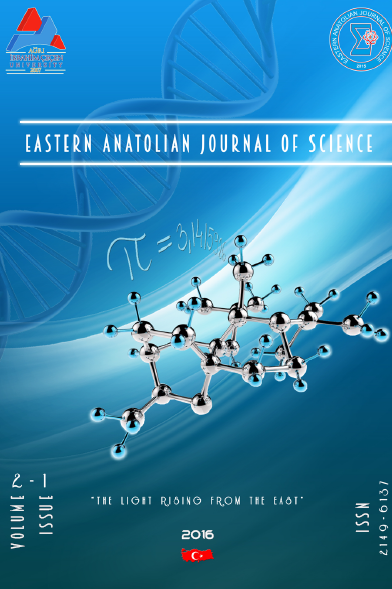An Evaluation of Earthquake Hazard Parameters in and around Ağrı
An Evaluation of Earthquake Hazard Parameters in and around Ağrı
b values, return period, expexted maxium, magnitude, Ağrı, Eastern Anatolia,
___
- AKI, K. (1965), Maximum likelihood estimate of b in the formula log N = a - bM and its confidence limits. Tokyo Univ. Bull. Earthq. Res. Inst. 43, 237–239.
- AMITRANO, D. (2012), Variability in the power-law distribution of rupture events. How and why does b-value change? European Physical Journal Special Topics, 205, 199-215.
- ASLAN, E. (1972), Magnitude and time distributions of earthquakes in Turkey. Bull Int Inst Seismol Earthq Eng. 7, 1–10.
- BATH, M. (1979), Seismic risk in Turkey—a preliminary approach. Tectonophysics. 54, 9–16.
- BAYRAK,Y., YILMAZTÜRK, A., ÖZTÜRK, S. (2005), Relationships between fundamental seismic hazard parameters for the different source regions in Turkey. Nat Hazards. 36, 445–462.
- BAYRAK, Y., ÖZTÜRK, S., ÇINAR, H., KALAFAT, D., TSAPANOS, T. M., KORAVOS, C. G., LEVENTAKİS, G. A. (2009), Estimating earthquake hazard parameters from instrumental data for different regions in and around Turkey. Eng Geol. 105, 200–210.
- BAYRAK, Y., ÖZTÜRK, S., ERDURAN, A., (2002), The relationships between maximum magnitudes and modal values for different regions of Turkey. 3rd balkan geophysical congress and exibition 8–4, 24–28 June, Sofia, Bulgaria.
- BAYRAK, E., YILMAZ, Ş., SOFTA, M., TURKER, T., BAYRAK, Y. (2015), Earthquake hazard analysis for East Anatolian Fault Zone, Turkey, Nat. Hazards, 76, 1063-1077.
- BOZKURT, E. (2001), Neotectonics of Turkey – a synthesis. Geodinamica Acta. 14, 3-30.
- ELİTOK, Ö. and DOLMAZ, M. N. (2011), Tectonic Escape Mechanism in the Crustal Evolution of Eastern Anatolian Region (Turkey), New Frontiers in Tectonic Research - At the Midst of Plate Convergence, Dr. Uri Schattner (Ed.), ISBN: 978-953-307-594-5, InTech, Available from: http://www.intechopen.com/books/newfrontiers-in-tectonic-research-at-the-midst-of-plate-convergence/tectonic-escape-mechanism-in-the-crustalevolution-of-eastern-anatolian-region-turkey
- ERDİK, M., ALPAY, B. Y., ONUR, T., SESETYAN, K., BİRGÖREN, G. (1999), Assesment of earthquake hazard in Turkey and neighboring regions. Ann Geophys. 42, 1125–1138.
- FROHLICH, C., DAVIS, S. C. (1993), Teleseismic b values; or, much ado about 1.0. J Geophys Res. 98, 631–644.
- GUTENBERG, R., RICHTER, C. F. (1944), Earthquake magnitude, intensity, energy and acceleration. Bull Seismol Soc Am. 32, 163–191.
- GOEBEL, T. H. W., SCHORLEMMER, D., DRESEN, G., and BECKER, T. W. (2012), Stress-driven in bv alues during stick-slip on laboratoty fracture granite surfaces. Journal of Geophysical Research. Doi:10.1029
- KAYABALI, K., AKIN, M. (2003), Seismic hazard map of Turkey using the deterministic approach. Eng GeoL. 69,127–137.
- LOPEZ, C. C., SANZ DE GALDANO, C., DELGADO, J., PEİNADO, M.A. (1995), The b parameter in the Betic Cordillera, Rif and nearby sectors. Relations with the Tectonics of the region. Tectonophysics. 248, 277–292.
- MANAKOU, M. V., TSAPANOS, T. M. (2000), Seismicity and seismic hazard parameters evaluation in the island of Crete and the surrounding area inferred from mixed files. Tectonophysics. 321, 157–178.
- MIYAMURA, S. (1962), Magnitude–frequency relations and its bearing on geotectonics. Proc Jpn Acad. 38, 27–30.
- MOGI, K. (1962), Magnitude–frequency relationship for elastic shocks accompanying fractures of various materials and some related problems in earthquakes. Bull Earthq Res Inst Univ Tokyo. 40, 831–883.
- MOGI, K. (1967), Earthquakes and fractures. Tectonophysics. 5, 35–55.
- MCNALLY, K. C. (1989), Earthquakes and seismicity. In: James DE (ed) The encyclopedia of solid earth geophysics. Springer, 308–315.
- PACHECO, J., SCHOLZ, C., SYKES, L. (1992), Changes in frequency–size relationship from small to large earthquakes. Nature. 355, 71–73.
- SCHOLZ, C. H., (1968), The Frequency–magnitude relation of microfracturing in rock and its relation to earthquakes. Bull Seismol Soc Am. 58, 399–415.
- SCHORLEMMER, D., Wiemer, S., and Wyss, M. (2005), Variations in earthquake size distribution across different stress regimes, Nature. 437, 539–542.
- SHI, Y., and BOLT, B. A. (1982), The standard error of the magnitude-frequency b-value, Bull. Seismol. Soc. Am. 72, 1677 – 1687.
- UDIAS, A., MEZCUA, J. (1997), Fundamentos de Geofisica, QE 501. Alianza Editorial, Madrid.
- WIEMER, S., WYSS, M. (1997), Mapping the frequency–magnitude distribution in asperities: an improved technique to calculate recurrence times. J. Geophys Res, 102, 15115–15128.
- WIEMER, S., and KATSUMATA, K. (1999), Spatial variability of seismicity parameters in aftershock zones. J. Geophys. Res. 13, 135-151.
- WIEMER, S. (2001), A software package to analyze seismicity: ZMAP. Seismol Res Lett. 72, 373–382.
- WIEMER, S., and WYSS, M. (2002), Mapping spatial variability of the frequencymagnitude distribution of earthquakes, Adv. Geophys. 45, 259 – 302.
- YARAR, R., ERGUNAY, O., ERDİK, M., GULKAN, P. (1980), A preliminary probabilistic assessment of the seismic hazard in Turkey. In: Proceedings of the 7th World conference on earthquake Engineering, Istanbul. 309–316.
- ISSN: 2149-6137
- Yayın Aralığı: Yılda 2 Sayı
- Başlangıç: 2015
- Yayıncı: Ağrı İbrahim Çeçen Üniversitesi
Emrah YERLİKAYA, Ramazan DEMİRDAĞ, Ömer KÜFREVİOĞLU, Cemal GÜNDOĞDU
An Evaluation of Earthquake Hazard Parameters in and around Ağrı
Yusuf BAYRAK, Ayşe Nur ATMIŞ, Hiwa MOHAMMADI, Erdem BAYRAK, Şeyda YILMAZ, Tuğba TÜRKER
3-People Non-Zero-Sum Games and Geometric Presentation on Game Theory
Çiğdem İNCİ KUZU, Bülent KARAKAŞ
Effective annealing of ZnO thin films grown by three different SILAR processes
